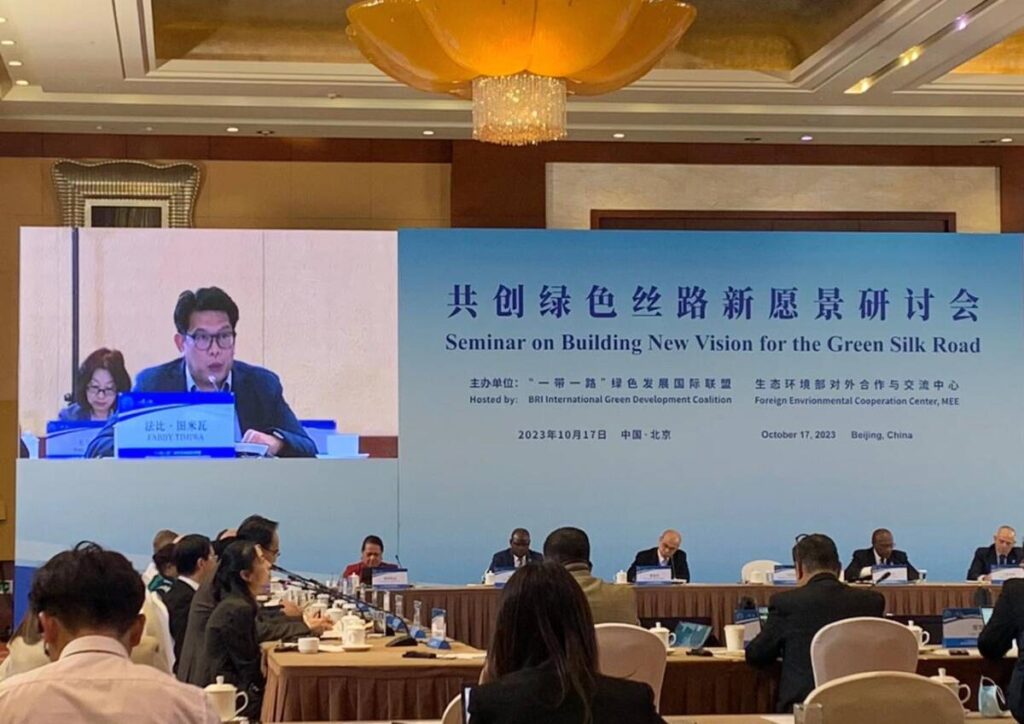Jakarta, October 17, 2023 – Marking the 10th anniversary of the Belt and Road Initiative (BRI) launch, China is hosting the third BRI International Cooperation Summit or Belt and Road Forum in Beijing on October 17-18, 2023. China’s theme is “High-quality BRI Cooperation: for Common Development and Prosperity” at this year’s summit. The Institute for Essential Services Reform (IESR), has been invited to the BRI Summit agenda and expects a breakthrough in the partnership between Indonesia and China regarding energy transition financing, including renewable energy, early termination of coal-fired power plant operations, green industry, and close collaboration in renewable energy technology to accelerate the energy transition.
The Executive Director of IESR, Fabby Tumiwa in his remarks at the High-Level Seminar Building a New Vision for the Green Silk Road in Beijing organized by the BRI International Green Development Coalition (BRIGC) and Foreign Environmental Cooperation Center (FECO), Ministry of Ecology and Environment of China, revealed that Indonesia needs considerable funding support, around USD 1 trillion, from developed countries and other countries, one of which is China, to achieve net-zero emissions by 2060.
“Financing is crucial to this transition. Accessible and affordable financing options can accelerate the global low-carbon transition, increase the adoption of green technologies, retire emission-intensive assets, and optimize energy asset portfolios,” Fabby said.
IESR believes that China can assist Indonesia in fulfilling its financial requirements to expedite the transition towards cleaner and sustainable energy.

“Through this BRI, China and Indonesia can partner to finance their energy transition. This partnership needs to involve financial institutions, technology providers, and the government to unlock more domestic financing, spur innovation, and drive shared economic prosperity,” Fabby explained.
Fabby believes developing renewable energy is crucial to reducing global emissions and preventing a severe climate crisis. Not only that, massive utilization of renewable energy will also increase Indonesia’s energy security.
Regarding technology, China is currently at the forefront of developing renewable energy, particularly solar power. In the roadmap for decarbonizing Indonesia’s energy system to achieve the Paris Agreement’s target of zero emissions by 2050, IESR found that Indonesia needs to utilize solar energy through solar PV up to 80% of the energy system in Indonesia by 2050.
“According to IESR’s Deep Decarbonization study, by 2030, renewable energy capacity needs to reach 138 GW, with solar power being the dominant source. On the other hand, China currently controls about 90% of global solar panel manufacturing capacity and half of global wind turbine manufacturing capacity. Therefore, the massive renewable energy market potential in Indonesia can be fulfilled by Chinese companies. At the same time, there is a need to build renewable energy manufacturing capacity and transfer technology to Indonesia. Bilateral cooperation between the two countries can facilitate and accelerate this process,” said Deon Arinaldo, Energy Transformation Program Manager, IESR.
Deon added that China invests in Indonesia’s energy, industrial, and infrastructure sectors. This is an opportunity for both countries to strengthen their cooperation by shifting investment plans currently centered on supporting fossil energy to the development of the renewable energy industry.

